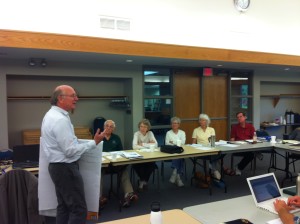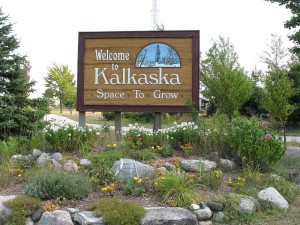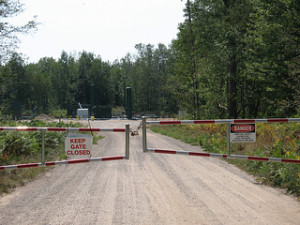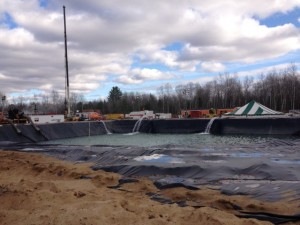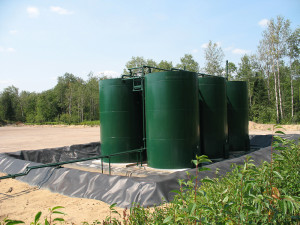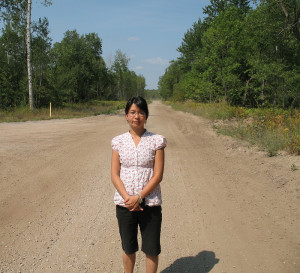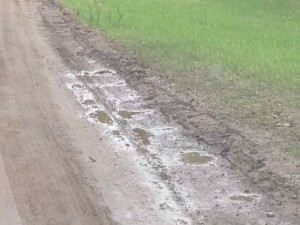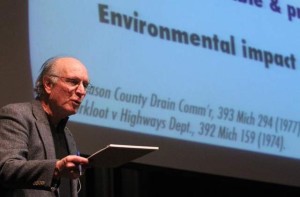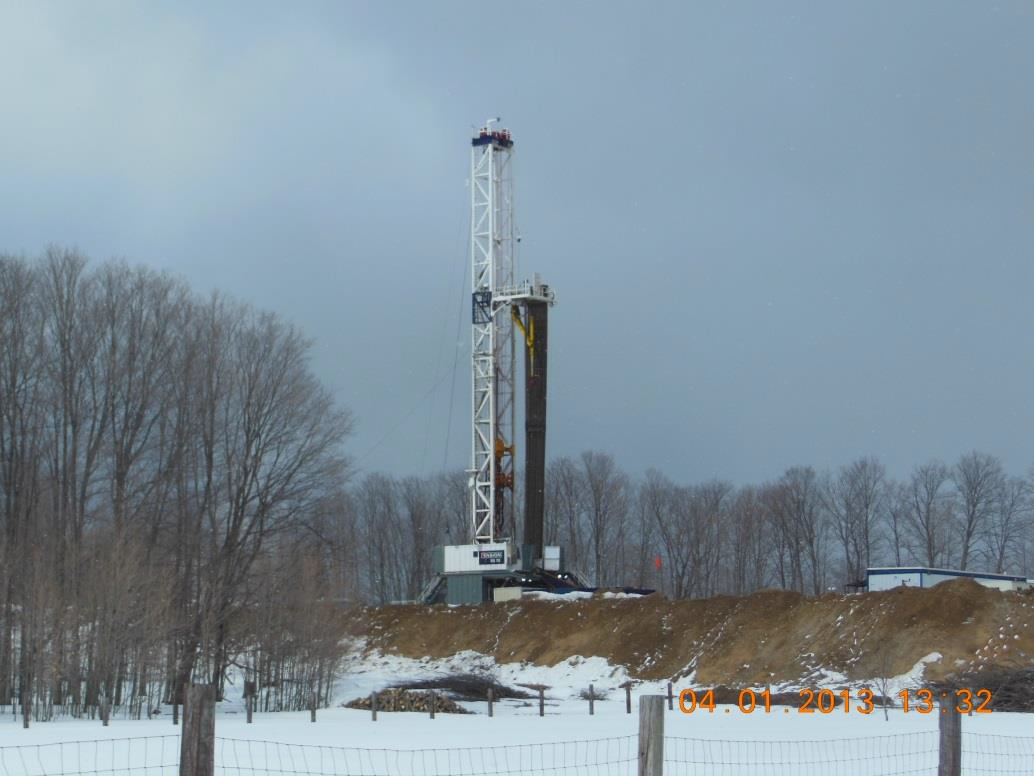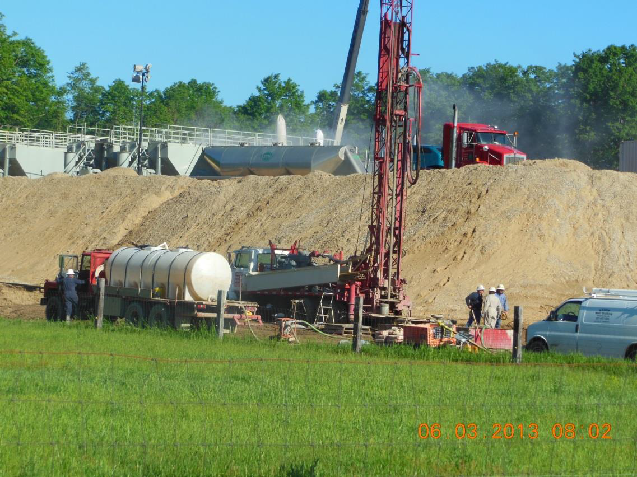Ross Hammersely and Kate Redman, attorneys with the Traverse City law firm, Olson, Bzdok & Howard, have done a marvelous service for local government officials, planners, administrators, property owners, industry, and the public in publishing a cogent, objective article on the scope and nature of local government regulation, including zoning and police power ordinance tools, to address oil and gas development, including recent large-scale hydraulic fracturing. This is a must read for those interested in land use planning, local government, proper development, and the protection of neighborhoods, farms, recreational lands and uses, and the environment and quality of life in Michigan. – Jim Olson Click here to view and download the article as a PDF, or read on below. See original article also at michbar.org.
Local Government Regulation of Large-Scale Hydraulic Fracturing Activities and Uses
The development of oil and natural gas resources using highvolume hydraulic fracturing (fracking) has become an increasingly politicized and controversial issue in recent years. The attention is due to a profound industry shift from the relatively shallow, vertical wells used for several decades in Michigan to significantly deeper well bores requiring unprecedented volumes of chemically treated water and sand, as well as other support activities and uses.1 The intensified scale of this type of well has resulted in nearby communities experiencing new and greater effects from fracking operations including increased noise levels, traffic volumes, water use, and hazardous chemical transportation, among others. As a result, whether a community welcomes or opposes fracking, local governments have a growing interest in exercising regulatory control over fracking and its ancillary activities, uses, and effects. This article explores the extent to which local governments have authority to exercise police power and zoning approval to regulate fracking in light of evolving state and federal regulation.
State and federal regulation of fracking
Local governments in Michigan may only exercise powers delegated by statute or the Michigan Constitution, and powers that can be fairly implied from those sources.2 Once granted, a power should be liberally construed in favor of local governments but is subject to preemption by state or federal law.3 An important threshold question in determining local authority to regulate fracking is the extent of federal and state regulation.
Federal regulation of fracking
Federal regulation of fracking could have the effect of preempting state or local regulation under the Supremacy Clause of the United States Constitution.4 However, oil and natural gas development via fracking is largely exempt from major federal environmental laws and regulations including the Safe Drinking Water Act,5 Clean Water Act,6 Solid Waste Disposal Act,7 Clean Air Act,8 and the Emergency Planning and Community Right to Know Act.9 Accordingly, regulation of fracking and its related activities and uses falls primarily to the states.10
State regulation of fracking
The Michigan Department of Environmental Quality (MDEQ) is the primary agency regulating fracking in the state, and issues permits under authority of Part 615 of the Natural Resources and Environmental Protection Act and its associated regulations.11 Part 615 grants authority over the “administration and enforcement of all matters relating to the prevention of waste and to the conservation of oil and gas,” as well as jurisdiction over persons and things necessary to enforce this authority.12 The MDEQ asserts authority to regulate many components of fracking under this provision, including well location and spacing, drilling/construction timetables, certain production operations, waste and emissions management, well plugging, and site restoration.13 A permit holder under Part 615 is exempted from certain other regulations, including soil erosion permits and the water withdrawal statute.14 The water withdrawal statute also expressly preempts local governments’ authority to regulate large water withdrawals to the extent provided in the statute.15 Some commentators have suggested that the MDEQ’s authority preempts all local regulatory authority,16 but the Michigan Supreme Court has rejected this conclusion. State law preempts local ordinances when the ordinance directly conflicts with a statute or the statute “completely occupies the field that [the] ordinance attempts to regulate” either explicitly or by implication, which can be assessed by looking at factors such as pervasive state regulation, legislative history, or a need for uniformity. Applying these standards to Part 615, the Michigan Supreme Court held that “the exclusive jurisdiction of the Supervisor of Wells applies only to oil and gas wells and does not extend to all aspects of the production process,” and affirmed the ability of local governments to regulate other aspects of oil and gas development if not expressly preempted by another statute.17 Under this precedent, there is a role for local regulation of oil and gas wells and ancillary activities, facilities, and uses, and water withdrawal wells, as long as the regulation does not directly conflict with Part 615 and is not limited or preempted by Part 615 or another statute.18
FAST FACTS: The development of natural gas resources by high-volume hydraulic fracturing, or “fracking,” is exempt from most federal regulation under environmental laws. Fracking regulation is left primarily to the states. In Michigan, the supervisor of wells has exclusive jurisdiction to regulate and control the drilling, completion, and operation of oil and gas wells. Subject to statutory limits, local governments retain police power and zoning authority to regulate certain ancillary activities and effects related to fracking, including truck traffic, unsafe material transportation and storage, certain types of pipelines, and other similar effects.
Permissible scope of local regulation of effects of fracking
Michigan’s oil and gas regulations do not address many of the effects of fracking and its ancillary activities, facilities, and uses that would ordinarily be issues of local concern subject to local regulation. For example, fracking requires the transport, storage, use, and disposal of large volumes of water, sand, and potentially unsafe chemicals, resulting in perhaps as many as 100 additional truck trips a day per well during certain active periods,19 with attendant noise, pollution, wear and tear on roads, and environmental risk. The scope of local authority to regulate in these areas under (1) the Michigan Zoning Enabling Act (zoning act) and (2) the police power to control for the public health, safety, and welfare is subject to both the usual reasonableness constitutional limits on police power authority20 and some limits unique to oil and gas wells. However, there is likely still ample room for carefully designed and reasonable local regulation of these types of activities, facilities, and uses.
Zoning regulation
The zoning act delegates broad authority to local governments to regulate land use for public health, safety, and welfare purposes, including the expressly stated authority to zone and regulate land use related to energy and transportation based on a master plan that includes consideration of energy uses.21 However, the act limits this authority when it comes to oil and gas wells.22 First, the act states that “[a] county or township shall not regulate or control the drilling, completion, or operation of oil or gas wells… and shall not have jurisdiction with reference to the issuance of permits for the location, drilling, completion, operation, or abandonment of such wells.”23 It’s notable that, on its face, this limitation does not apply to villages or cities, extends only to wells themselves, and does not include zoning of all ancillary activities, facilities, and uses associated with fracking or zoning of water wells and pipelines. Second, the statute does not allow local governments to exclude or ban a land use if there is a demonstrated need for it in the area unless an appropriate location for the use does not exist; fracking or its ancillary uses cannot be banned without meeting this stringent test.24 The Michigan Supreme Court has affirmed that, subject to Part 615 preemption, the zoning act provides limited authority for a local government to adopt zoning regulations for fracking and particular ancillary activities, facilities, or uses not otherwise regulated by Part 615.25 The Court has not provided further guidance on the scope of this authority or the preemptive effect of the water withdrawal statute, but there are a few particular areas that likely remain subject to local regulation, both in terms of the subject areas of regulation and special zoning tools provided by the zoning act.
Areas of Regulation. First, local governments could address ancillary fracking facilities and uses not included in the definition of the “operation” of a gas well by Part 615 regulations.26 A court may not agree with the MDEQ’s definition of this term, but it is at least a safe starting point and might include, for example, transportation of certain materials to and from the well pad, the use of roads other than the access road to the well pad, and regulation of ancillary storage tanks and other facilities. Local governments can likely place zoning regulations on water withdrawal wells and pipelines as long as they do not regulate the withdrawal quantity or the adverse effects on surface water regulated by the water withdrawal statute.27 Second, the Part 615 regulations themselves incorporate provisions of local zoning codes that authorities could better inform and affect through local zoning regulations. For example, Part 615 regulations provide that a person shall not cause a “nuisance noise” in the production or handling of gas, and take into account an area’s environmental values. As such, the definition and measurement of what constitutes nuisance noise and environmental value could be informed by the local government’s clear development of these concepts in its zoning and master plan.28 Finally, land uses in zoning districts with oil and gas resources can be limited to uses compatible with the noise, pollution, traffic, and risk of hazardous spills generated by fracking.
Tools for Regulation. The zoning act provides useful tools unique to a local government’s zoning authority. Most notable are (1) amending a master plan to identify the environmental resources and the location of natural gas resources relative to other land uses that might be inconsistent with fracking and its ancillary facilities and uses, such as residential areas, parks, and natural areas;29 (2) identifying ancillary fracking facilities and uses and nonexempt water well uses as “special land uses” subject to a more rigorous review of traffic flows and other public health, safety, and welfare effects of the activity;30 and (3) imposing conditions and escrow requirements on the approval of these special uses in a manner designed to protect the public health, safety, and welfare from the identified risks of the activity.31
Police power regulation
It is fundamental that local governments have broad authority to adopt ordinances for the benefit of the public health, safety, and welfare, and there is a presumption in favor of the constitutionality of an ordinance exercising police power.32 Subject to the specific statelevel preemption detailed previously, fracking effects may be subject to regulation under this broad police power. For example, police power regulations might be adopted to address truck traffic, hazardous material transport, and various pipelines. The sharp increase in roadway activity and the possibly hazardous nature of the cargo carried on many of those trips present risks and concerns that a local unit of government could regulate by designating certain allowable routes for shipments of specific chemicals regulated as hazardous by the U.S. Department of Transportation to avoid and protect highrisk areas in the jurisdiction such as schools, residential areas, and commercial districts. Designating such routes and allowable truck staging and parking areas could also ensure that supporting infrastructure is available in the event of an accident. Local governments could also apply the requirement in Michigan’s Fire Prevention Code (Act 207) that any company handling hazardous chemicals provide the local fire chief certain information on written request, including a list of the hazardous chemicals on site, a material safety data sheet for those chemicals, and disclosure of the quantity and location on site of any such chemicals.33 Further, local governments would arguably be permitted to adopt ordinances governing “flow” or “gathering” lines, water or certain gas transmission pipelines, compressors, and other processing and associated equipment, as well as the construction, installation, relocation, alteration/modification, operation, or closure of pipelines off the well pad and over surrounding lands. Finally, emergency contacts and other locally focused accident planning requirements could potentially be adopted and implemented.
Moratorium power
Inherent in the police power and zoning authority, courts have recognized that local governments may adopt temporary moratoriums for a reasonable period pending research and adoption of regulation in that subject area.34 Local governments may use this authority to allow time to carefully design practical fracking regulation as described in this article.
Part 615 grants authority over the “administration and enforcement of all matters relating to the prevention of waste and to the conservation of oil and gas,” as well as jurisdiction over persons and things necessary to enforce this authority.
Conclusion
Police power and zoning tools remain available to communities and officials interested in exercising local decisionmaking authority to regulate the increasingly localized effects of expanding fracking; its ancillary activities, facilities, and uses; and water withdrawal wells in Michigan. However, any local regulations should be carefully crafted and designed to reasonably address specific risks imposed by fracking operations and to fit within the scope of local authority not otherwise limited or preempted by state law.
Ross A. Hammersley is an attorney with Olson, Bzdok & Howard, P.C., an environmental and municipal law firm in Traverse City, where his practice focuses on land use and zoning matters, oil and gas leasing and development issues, energy policy and utility regulation, environmental conservation, and Brownfield redevelopment. He is a co-chair of the Great Lakes and Inland Waters Committee of the SBM Environmental Law Section.
Kate E. Redman is also an attorney with Olson, Bzdok & Howard, P.C., where her practice focuses on land use, local government, small business, non-profit, and appellate law. Kate assists local governments throughout the state with developing and implementing zoning and police power ordinances.
ENDNOTES 1. Crawford, Fracturing Rocks to Unlock New Oil, 135 Mechanical Engineering 27 (December 2013), available at asme.org (accessed May 15, 2014). 2. See City of Taylor v Detroit Edison Co, 475 Mich 109, 115–116; 715 NW2d 28 (2006). 3. Const 1963, art 7, § 34; Ter Beek v City of Wyoming, 495 Mich 1, 8; NW2d (2014). 4. See generally Ter Beek v City of Wyoming, 495 Mich 1; NW2d (2014). 5. 42 USC 300h(d). 6. 33 USC 1362(24) and 1342(l)(2). 7. 42 USC 6921; see also 53 FR 25447 and 58 FR 15284. 8. Most fracking is unlikely to be subject to air quality regulation because oil and gas production sites do not qualify as “major source[s]” of hazardous air pollution. 42 USC 7412. 9. 42 USC 11023(b); 40 CFR § 372.23. 10. For a more expansive review of these exemptions, see Brady, Hydraulic fracturing regulation in the United States: The laissez-faire approach of the federal government and varying state regulations, 14 Vt J Envtl L 39, 43–52 (2013). 11. MCL 324.61501 et seq. and 1994 AC, R 324.101 et seq.; see also MCL 319.101–319.110; MCL 483.101–483.120; and MCL 483.151–483.162. 12. MCL 324.61505. 13. Rule 324.101 et seq. 14. Alcona Co v Wolverine Envtl Prod, Inc, 233 Mich App 238, 263; 590 NW2d 586 (1998); MCL 324.32727(1)(a). 15. MCL 324.32726. 16. Turrell, Frack off! Is municipal zoning a significant threat to hydraulic fracturing in Michigan?, 58 Wayne L R 279 (2012). 17. Addison Twp v Gout, 435 Mich 809, 813; 460 NW2d 215 (1990); see also Alcona, 233 Mich App at 263. 18. The Soil Erosion and Sedimentation Act has been held to preempt local governments from imposing stricter soil erosion requirements on the location of wellheads, access roads, pipelines, or processing facilities than is required under Part 615 because Part 615 is specifically exempted from the act. In contrast, Part 615 does not preempt a landowner from zoning regulations except to the extent specifically provided in the Michigan Zoning Enabling Act. See Alcona, 233 Mich App at 263. However, it should be noted that an operator with a Part 615 permit is expressly exempted from certain state-level regulations in addition to the soil erosion permits, including an exemption from the statute regulating water withdrawals, unless the withdrawal is a “diversion” under the act, meaning it is transferred into another watershed. MCL 324.32727(1)(a). The water withdrawal statute also explicitly preempts local governments from regulation of large water withdrawals. MCL 324.32726. 19. The state of New York prepared a comprehensive review of the roadway impacts and costs imposed by heavy truck traffic as well as numerous other potential environmental impacts related to fracking, which is available at dec.ny.gov; (accessed May 15, 2014).(For truck traffic discussion, see Section VI, Part B, pp 6-300–6-315.) 20. Plymouth Twp v Hancock, 236 Mich App 197, 199; 600 NW2d 380 (1999). 21. MCL 125.3101(1) and 125.3203(1). 22. Notably, fracking is probably not affected by the recent codification of the “very serious consequences rule” because the rule applies only to mining activities, and fracking does not fit within the common definition of “mining” or the definition set forth in the Natural Resources and Environmental Protection Act. MCL 125.3205(3)–(6) and 125.63201(g). 23. MCL 125.3205(2). Although not binding on a court for purposes of determining legislative intent, a court might look to the definition of these terms in the MDEQ regulations promulgated under Part 615, which provide that the “operation” of an oil and gas well includes production, processing, gathering, compressing, treating, transporting, conditioning, brine removal and disposal, separating, storing, injecting, testing, reporting, secondary recovery, and maintenance and use of surface facilities. See 1994 AC, R 324.103(c). 24. MCL 125.3207. 25. See Addison, n 17 supra. 26. See 1994 AC, R 324.102. 27. MCL 324.32723(c). 28. 1994 AC, R 324.504(4)(d) and 1994 AC, R 324.1015(1), (2), and (3)(c) and (d). These factors could include the identification of “quiet” as a primary consideration in use of public recreational sites near a well, or the identification of what level of noise will cause “injurious effects to human health or safety or the unreasonable interference with the comfortable enjoyment of life or property,” specific to areas around a well. These determinations are not necessarily binding on the MDEQ but may be informative. See also 1994 AC, R 324.505, 324.506, and 324.507. 29. MCL 125.3203 and 125.3843. 30. MCL 125.3502 and 125.3504. 31. See Cornerstone Investments, Inc v Cannon Twp, 239 Mich App 98, 106; 607 NW2d 749 (1999) (interpreting equivalent language in earlier zoning act). 32. Home-rule cities and villages enjoy all powers not expressly prohibited by law, and townships’ powers are to be liberally construed and include those fairly implied and not prohibited by the Constitution. Detroit v Walker, 445 Mich 682, 690; 520 NW2d 135 (1994); Hess v Cannon Twp, 265 Mich App 582, 590; 696 NW2d 742 (2005); see also Austin v Older, 283 Mich 667, 674; 278 NW 727 (1938). 33. See MCL 29.5p. However, there are exceptions and exemptions. See MCL 29.5p(4) and (6). 34. See Cummins v Robinson Twp, 283 Mich App 677, 719; 770 NW2d 421 (2009).


